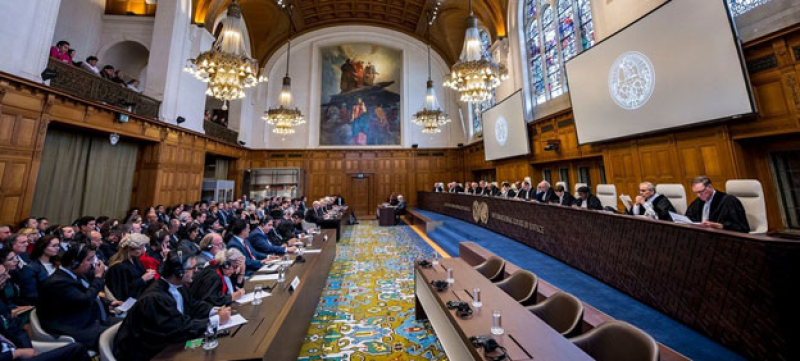- World Cup ticket prices to start at $60, may rise to $6,730 |
- Gazipur kitchen market fire under control after one hour |
- 10 MNC to enter bourse; Dhaka Stock Brookers laud BSEC |
- Dhaka bourse sees highest turnover in 12 months |
- Xi unveils vision for equitable global governance, rejects unilateralism |
ICJ Climate Ruling May Shape African Debt Justice

A view of the International Court of Justice (ICJ) at the Peace Palace in The Hague.
African sovereign debtors in distress face stark choices: paying creditors in full or financing essential services such as health, education, renewable energy, and water.
Negotiations with creditors typically focus on financial and contractual matters, while the environmental and social impacts of debt are largely ignored. Thanks to the initiative of Vanuatan law students, this may be about to change.
Vanuatu, a small island nation in the South Pacific, is among the countries most threatened by climate change, facing rising sea levels and severe storm surges. In 2019, law professor Justin Rose asked his students to devise responses to these challenges. They proposed that Vanuatu request an advisory opinion from the International Court of Justice (ICJ) on states’ legal obligations regarding climate change. Their government embraced the idea and successfully rallied global support.
In 2023, the UN General Assembly asked the ICJ to clarify states’ duties under international law to address climate change and the legal consequences of failing to meet these obligations. The case drew unprecedented attention: more than 150 written submissions and over 100 oral presentations during nine days of hearings. On 23 July 2025, the ICJ delivered a unanimous advisory opinion — only the fifth in its history.
The court ruled that states’ obligations extend beyond treaties to include customary international law, binding all states regardless of treaty participation. Two key duties were highlighted: preventing significant environmental harm through due diligence and cooperating internationally to solve environmental, social, and humanitarian challenges. The ICJ stressed that a healthy environment underpins fundamental human rights, including the rights to life, health, and livelihoods.
Although advisory, the opinion carries significant weight. Its grounding in environmental and human rights law has far-reaching implications, including for the restructuring of African sovereign debt. Debt decisions affect states’ capacity to reduce emissions and protect citizens’ rights, making it vital for debt negotiations to address environmental and social impacts.
Three avenues may emerge:
Debtor states can use the opinion to argue for including climate and social impacts in negotiations, highlighting creditors’ shared obligations.
Stakeholders can remind debtors and creditors of international standards, including the UN Guiding Principles on Business and Human Rights, the UNCTAD Principles on Responsible Borrowing and Lending, and the World Bank’s Environmental and Social Framework.
Activists can use the ruling to press for accountability, asserting that both debtor and creditor states must ensure their actions — and those of companies under their jurisdiction — prevent significant harm.
Non-state actors can also leverage mechanisms such as OECD National Contact Points and accountability systems in multilateral development banks. Courts in many countries are increasingly open to climate-related litigation.
Ultimately, states and financial institutions can avoid such consequences by aligning debt management with the ICJ’s opinion, ensuring that solutions respect environmental and human rights obligations.

